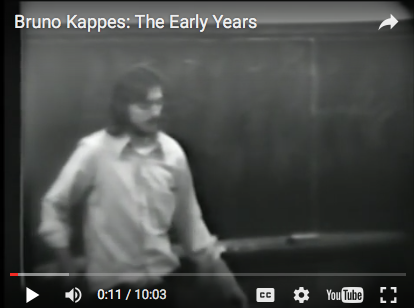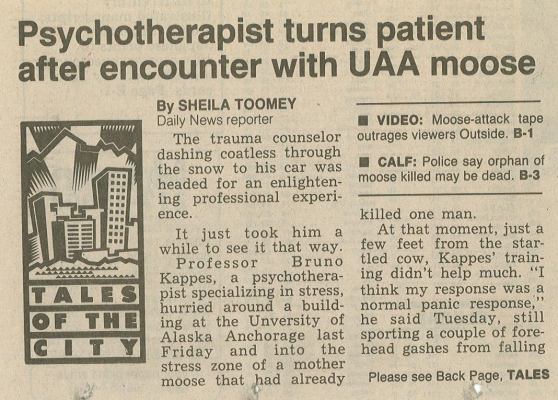Bullock Prize winner Bruno Kappes bids UAA 'au revoir mais pas adieu'
by Kathleen McCoy |
In his long teaching career, Kappes says he went "from the Flintstones to the Jetsons."
Emeritus psychology professor and Bullock award-winner Bruno Kappes was headed out the door, literally.
In a day or two, he would leave for Paris, France where he has shared a home and long-distance life with his French-born wife of 16 years. Their home together is on the top floor of a 1925 stone residential building overlooking a classic Parisian square and marketplace in the 12th arrondissement at Place Daumesnil. Kappes, also French-born, maintains dual citizenship by birth.

Bruno Kappes
But we're getting ahead of ourselves. On his final day in his office, a few graduate students packed up the last boxes and moved gear from the anteroom of SSB 219, the suite home of Kappes' windowless UAA faculty office in the Social Sciences Building.
Fittingly, SSB was UAA's first library building. When Kappes arrived in 1979, it was one of only two buildings on campus-the sciences building, now natural sciences, was the other.
"The street out front was a lane each way, with a little flashing light at the intersection," he recalled. The community college, ACC, was through dense trees to the west.
A weary young Kappes had driven nine long days to get here from Kansas City. He missed the public university campus entirely, ending up at what is now Alaska Pacific University. He liked what he saw. When he learned he was in the wrong place, and that his college was those two buildings back there in the woods, "I was ready to turn around and drive back!" he said.
But he didn't. Instead, he carved out a significant academic and professional service career at UAA that has lasted 37 years. With pioneer spirit, he says he helped to build UAA as we know it today.
So on this final day in his office, the bookshelves stand bare. Fittingly, his computer monitor flickers in the dim light, a suitable tribute to a much-lauded professor who developed and championed online elearning for psychology students at UAA and around the globe.
A career of accomplishments
Exit interviews are fun to do, and Kappes warmed to the chore. Many a departing subject is relaxed and headed on to the next adventures. As they leave behind one world for another, they

From 'Bruno Kappes: the Early Years,' teaching one of his first classes as a teaching assistant in 1973 at the University of Missouri. Find this video at http://afbmk.uaa.alaska.edu/media.html.
often share wisdom and insight-campus and higher education "smarts" accumulated over their professional years.
"I have had seven (University of Alaska) presidents, 10 chancellors, 17 provosts and 26 deans while at UAA," he said. He was also the longest-serving member of the Faculty Senate, by his count, 24 years. "I was there before there even was a senate," he said, "when we just had opening meetings, town-hall style."
Kappes made his mark. Let's start with accolades. After 43 years of university teaching, 37 of them at UAA, his work has won much notice. Earlier this month, the University of Alaska Foundation honored him with the Edith R. Bullock Prize for Excellence, noting his pioneering attitudes and successes in delivering psychology courses to thousands of students over the years.
The award is available to any UA student, staff or volunteer who has made a significant contribution toward furthering the university's mission of "inspiring learning, and advancing and disseminating knowledge through teaching, research and public service." It carries a $15,000 financial award.
In a nomination letter, John Petraitis, UAA associate dean of social sciences, wrote: "Professor Kappes has sustained extraordinary achievement and inspired learning through an accomplished history of advancing and disseminating knowledge through teaching, research and public service. He has taught more generations of Alaska students by virtue of his unique capacity to provide successful instruction to large numbers of Alaska students statewide, as well as nationally and internationally."
Indeed, Kappes was very serious about correcting some misinformation as to the total number of students he has taught in his career. He said he's seen references to 50,000 (too many) and 25,000 (too few). The correct number, he says, is 30,000-plus. He credits those high numbers to his 10 years spent teaching on television, as well as embracing elearning as a new teaching strategy enabled by technology-a key motivator for him.
While many senior faculty can struggle with the speed of technological change, Kappes embraced it. "It couldn't happen fast enough for me," he says.
His Bullock Prize joins many others-seven for teaching, another seven for merit, Chancellor's awards, CAFE awards and research and service awards.
From cold injuries to forensic psychology
His work on frostbite and cold injury working 17 years with Dr. William Mills, an orthopedic surgeon, UAA's one-time team doctor, and the world's authority on cold injury, expanded his knowledge and influence. His research included work with cold-weather sports participants like distance swimmer Lynn Cox, Iditarod musher Susan Butcher, as well as many other 'Idita's' out there: Iditaskiers, Iditabikers and Iditasnowshoers.
He's delivered his research papers in 15 countries around the world, from Western Europe and Scandinavia to Australia, from China and Japan to Russia. Many clients also depended on his counseling and medical advice; he maintained a private practice during his teaching career, working extensively with biofeedback and several local hospitals and, more recently, as an expert witness in forensic psychology for the court system.
Kappes taught 17 years with WWAMI, and worked as adjunct clinical psychology faculty at the University of Washington School of Medicine for 24 years. He's held several visiting professorships and exchanges, including eight summers at University of Hawaii, Honolulu and a year at the American University of Paris while simultaneously teaching for UAA. He says he never missed a summer session in 37 years, even when on sabbatical.
By any measure, these years represent sustained commitment. His bifurcated life, split between Alaska and France, meant he spent most of his Alaska weekends at his computer, working on questions that completely engaged him.
"I lived like a bachelor," he said. "My wife was in France. I didn't have a dog, not even a plant. My daughter is 28." It was a work-intense life that he wanted to live.
Embracing technology, but only as a tool
Kappes maintains an ePortfolio site that tells his professional story well. Visitors will find footage of his 1995 attack by a moose (more on that later), and a scratchy black-and-white video of his first lecture as a young teaching assistant at the University of Missouri. He calls it, "Bruno Kappes: The Early Years," truly a vintage don't-miss. "I was known as a 21-year-old hippie in those days," he says, smiling.
We watched a part of it on his computer. His long-haired former self picks up white chalk and scratches out the four medical models on a blackboard. This prompts some professorial humor. "I was like the Flintstones, scraping on the walls with a piece of chalk. Now, we are using Skype, like the Jetsons. In my career, I went from the Flintstones to the Jetsons," he says.
Kappes is keen to explain how education has changed in his professional lifetime. The older model, he says, was essentially all about the professor's knowledge. The focus for years has been about the teaching and very little about the learning.
"The problem with this lecture approach was it promotes top-down teaching. It was all about me and retaining my specific knowledge," he said. "What do I know? I have to be engaging, challenging, intelligent, on the mark. It was only about me, my interpretation, and the students' capacity to memorize and repeat what I have said...200 students all had to become me."
Technology has shifted that dynamic to "bottom-up" learning, Kappes said. "Now, everyone has to participate. You can't sleep in class, you can't miss class, and everything you do is recorded. It is no longer about what I know, but having students demonstrate what they know. It's like an Easter egg hunt, and I have buried some of the many available eggs through elearning pedagogy and course design structure. They can have a learning experience, and come back and report it to the rest of the class. So, you have 100 students blogging about what they are learning. They are engaged with the course material and with their peers in a profound way."
Since 2000, he has taught exclusively via elearning. He says he has avoided classroom teaching as he recognized its limitations and believes it to be inconsistent with the way today's technology-savvy students learn.
His ePortfolio site includes a thoughtful presentation on "eFolio thinking in eLearning environments" which captures many of his online-learning insights. Kappes says he plans to donate his many recorded lectures to MERLOT, an acronym for Multimedia Educational Resources for Learning and Online Teaching.
Some surprises
Many may recall the tragic incident between a female moose and a 71-year-old man on the UAA

A city columnist interviewed Bruno Kappes on surviving a moose encounter. He's saved these windows onto his history at his ePortfolio site. http://afbmk.uaa.alaska.edu/
campus back in 1995. People likely are less familiar with Kappes' run-in with that moose on Friday of the same week, a date he notes was a "Friday the 13th."
With help from a campus officer, Kappes was safe, though the moose died as a result of the encounter. Kappes documented the news incident on his ePorfolio site, including reporting by the popular Anchorage Daily News' Tales of the City columnist, Sheila Toomey. It led him down a therapy and research path related to moose as "totem animals," with significance tied to childhood trauma. The encounter led Kappes to recall a sense of total abandonment that he had long ago experienced when his parents needed to leave him, a 4-year-old, in France with family until they could obtain his U.S. papers.
He expressed thoughts of writing a book about this moving experience by relating his personal growth to Native ways of knowing, and calling it "Moose Medicine."
That was one surprise. The other was Kappes' commitment to truly retire, despite a professional and academic life that was so fully engaged and engaging for him.
He's ready to turn to a new chapter, he says. Paris is home to 150 museums: "I am interested in culture, arts, music, dance, theatre. All of that is in Paris," he said.
Won't he miss his students?
Kappes had to think about that one. Then he offered, "Anyone I find on the street is my student. Whether they want to know something or not, I will teach them."
He said he could pick up a class or two at the American University of Paris, where he has taught before.
"But probably not," he said. "I am not looking for responsibilities. I have had multiple responsibilities-from students to clients to organizations, etc., all my life.... You know what I'm saying?"
Written by Kathleen McCoy, UAA Office of University Advancement
 "Bullock Prize winner Bruno Kappes bids UAA 'au revoir mais pas adieu'" is licensed under a Creative Commons Attribution-NonCommercial 4.0 International License.
"Bullock Prize winner Bruno Kappes bids UAA 'au revoir mais pas adieu'" is licensed under a Creative Commons Attribution-NonCommercial 4.0 International License.









